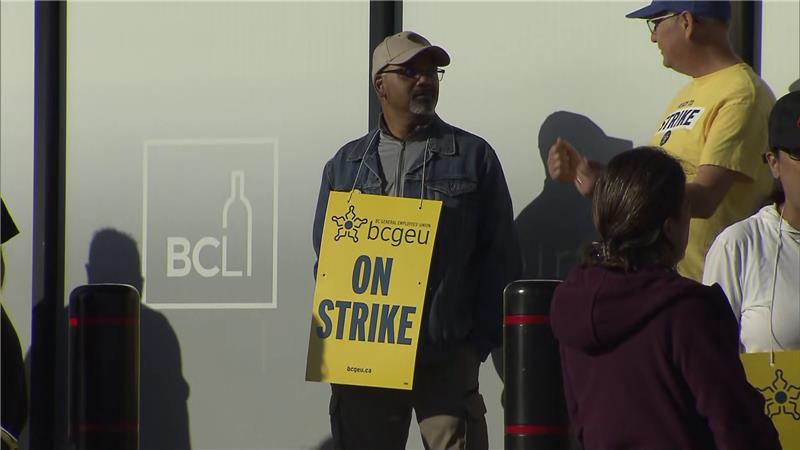Twenty-five B.C. liquor stores closed their doors Wednesday as retail employees joined escalating strike action by public sector workers.
The BC General Employees’ Union (BCGEU) says more than 600 workers walked off the job at key Liquor Distribution Branch stores.
“These locations were chosen because they represent a significant source of government revenue. By withholding their labour at both warehouses and retail stores, public service workers are sending a clear message: they are essential to generating the revenue that funds the vital services British Columbians depend on every day,” the union stated.
Additionally, nearly 1,000 workers at a multi-ministry site in Victoria have joined the strike, including employees of the agriculture, environment, forests, jobs, tourism, and water ministries.
Earlier this week, the strike expanded to BC Liquor and Cannabis warehouses and the head office.
“We recognize this escalation will impact the restaurant industry and small businesses, who are being caught in the middle of this dispute. That’s why we’re calling on them to join us in pressing government to return to the table. Like them, we are frustrated that government continues to stall and refuses to return to the table to negotiate,” said BCGEU President Paul Finch.
He tells CityNews that the provincial government has many reasons to negotiate.
“Polling shows that our position is broadly supported by the public. Government’s position is not, and frankly, this is now the longest,– as we understand it — the longest public service strike in B.C. history, which is not a great legacy for this government,” said Finch.
Ian Tostenson, president and CEO of BC Restaurant and Food Services Association, says the latest escalations have been disruptive to restaurants.
“We’re running on inventories right now, but I would say by the end of this week, beginning of next week, we’ll start to feel out of stock in our restaurants. Certainly trying to alleviate some of that by purchasing local through local wineries, and breweries, and distilleries. But this whole thing is really disruptive and at a time when we should be focusing on other things, not chasing around trying to find product,” said Tostenson.
He says one business, running low on stock, reported Wednesday being limited to buying just three bottles of each product it ordered from distributors.
Operating a restaurant, Tostenson says, is already challenging enough.
“Everybody’s really minding how they’re spending money and being very selective how they’re spending money. And so when we should be concentrating on operating our businesses that are efficient and making sure that we’re well-employing people, we’re chasing around trying to find products. Seems to me to be a complete waste of time. And you’ll hear us, after this is finished, start talking about other ways of accessing product so that we don’t get caught in a labour dispute in the future.”
“Our members are just as equally worried about their livelihoods,” said Finch.
“We would ask [businesses] to join us in demanding government, get back to the negotiating table with a real wage offer.”
Wednesday’s action brings the number of workers involved in job action to around 14,000.
—With files from Monika Gul and Srushti Gangdev

